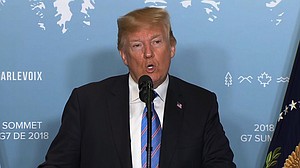6/11/2018

By Lauren Fox and Daniella Diaz, CNN
(CNN) -- Just hours ahead of a historic summit in Singapore, lawmakers back in Washington are openly questioning President Donald Trump's latest global strategy with some bemoaning that the White House is alienating American allies while simultaneously stretching the bounds of cooperation with long-held enemies.
Trump is scheduled to meet Tuesday with North Korean leader Kim Jong Un just days after ruffling feathers at the G7 summit in Canada and engaging in a public spat with Canadian Prime Minister Justin Trudeau, a move that even a handful of lawmakers in the President's own party are questioning.
On Friday, Trump called for Russia to be added to the summit to restore it the G8, a statement that Nebraska Republican Sen. Ben Sasse said was "weak."
"This is weak. Putin is not our friend and he is not the President's buddy. He is a thug using Soviet-style aggression to wage a shadow war against America, and our leaders should act like it," Sasse said.
Saturday, Trump summit pulled the US endorsement of the summit communique -- a joint statement that was signed by all the other G7 participants: Canada, France, Germany, Italy, Japan and the United Kingdom.
Trump announced on Twitter he had made the decision following comments from Trudeau that Canada would move ahead with imposing retaliatory measures on the US in response to newly imposed tariffs imposed by the US on aluminum and steel.
"I have made it very clear to the President that it is not something we relish doing, but it something that we absolutely will do," Trudeau said. "Canadians, we're polite, we're reasonable, but we also will not be pushed around."
White House trade adviser Peter Navarro said Sunday on Fox News that "there's a special place in hell for any foreign leader that engages in bad-faith diplomacy with President Donald Trump and then tries to stab him in the back on the way out the door."
Hours later, Arizona Republican Sen. Jeff Flake tweeted a link to an article about Navarro's comment with a message: "Fellow Republicans, this is not who we are. This cannot be our party."
And GOP Rep. Adam Kinzinger said he was "confused" when he saw the remarks from Navarro.
"Look, as a guy that believes in heaven and hell, I would never use those terms ever," he told CNN's Kate Bolduan on "At This Hour" on Monday. "I thought that was inappropriate. We can have disagreements as allies and I don't even mind the President going there with a tough message because, look, we want a fair deal, but to go to that level, when I woke up and saw that headline, I was a little confused."
McCain responds
Sen. John McCain, who is battling brain cancer in his home state of Arizona, called out the President in a tweet Saturday for not siding with US allies at the summit.
"To our allies: bipartisan majorities of Americans remain pro-free trade, pro-globalization & supportive of alliances based on 70 years of shared values," the Arizona senator tweeted. "Americans stand with you, even if our president doesn't."
But other Republicans have held their tongue, wary of doing anything to undermine Trump's negotiating hand ahead of the President's meeting with Kim in Singapore.
McCain's best friend and colleague in the Senate, South Carolina Sen. Lindsey Graham, disagreed with his statement on Twitter, saying even though he and McCain believe in free trade, the majority of Americans might not.
"I'm not so sure John's right about where America is on trade," Graham said on "This Week." "The Bernie Sanders element of the Democratic Party doesn't stand for free trade. Hillary Clinton said she would get out of the Trans-Pacific Partnership if she had become president. There is a movement in our party that Trump's seized that got him the nomination, and eventually became president of the United States."
He continued: "So I'm not so sure a majority of Americans believe that globalization and free trade is in our interests. I believe that, John McCain believes it ... but I'm not so sure most Americans (agree)."
But the tension between traditional Republican orthodoxy on trade and foreign policy is being tested and so far very few Republicans appear ready to confront Trump.
On trade, Tennessee Republican Sens. Bob Corker has introduced legislation that would roll back the President's power to impose tariffs like the ones he introduced earlier this month on steel and aluminum on U.S. allies, but Republican leaders don't appear eager to take it up even as an amendment to already-moving legislation.
Democrats, meanwhile, have been more outspoken.
"This week started with @realDonaldTrump boosting a Chinese company identified as a national security threat to the U.S. It ended with him standing up for Russia and alienating our allies at the G7. #MAGA," House Democratic Leader Nancy Pelosi tweeted over the weekend.
Senate Minority Leader Chuck Schumer, a New York Democrat, accused Trump of executing Putin's diplomatic and national security strategy, not America's.
"Are we executing Putin's diplomatic and national security strategy or AMERICA's diplomatic and national security strategy? After the last few days, it's hard to tell," he tweeted.
